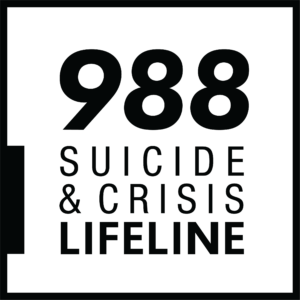Recognize Signs of Distress
Many people are afraid to talk about suicide, but it is often a great relief to someone thinking about suicide to know that you have noticed their pain. Often, people struggling with depression or having suicidal thoughts give clues to how they’re feeling. You can be the first step towards help for someone you care about by recognizing the warning signs of suicide and taking steps to make them feel heard.
- Family history of suicide or mental health disorders
- Previous suicide attempts
- Physical/mental illness
- Physical, sexual, domestic, or child abuse/trauma
- Substantial loss (relational, social work, financial)
- Facing oppression and injustice, such as racism and/or sexism
- Substance use or addiction, including behavioral addictions such a gambling
- Homelessness
- Challenges that LGBTQ+ people face, such as discrimination and anti-LGBTQ+ policies
- Lack of access to behavioral healthcare
- Isolation
- Poor coping or problem-solving skills
- Access to lethal means
- Talking, writing, or joking about death, dying, or suicide
- Feelings of sadness or hopelessness, often accompanied by anxiety
- Direct statements, such as “No one would miss me if I were gone”
- Declining school or work performance
- Loss of pleasure/interest in hobbies and activities
- Impulsive behavior
- Withdrawing from friends and family
- Sleeping too little or too much
- Changes in mood
- Fluctuations in weight or appetite
- Depressed
- Out of control
- Confused
- Overwhelmed
- Isolated
- Worthless
- Helpless
- Hopeless
How to Help

Listen
If you know someone who might be thinking about suicide, you can help them first by listening. Very often, people who think suicide is a choice for them feel like they have no other options. Listening to someone can show that you care, give them a greater feeling of control, and help them feel connected to someone else.
One way to invite conversation is by using open-ended questions, such as “What brought these feelings on?”or “What do you do when you feel like this?” Make sure to show that you’re an active, attentive, and empathetic listener by validating their feelings. Let them know that it takes a lot of courage to talk about this topic, that you’re here to listen, and that they shouldn’t have to go through this alone.
Ask
Asking about suicide can be scary, but it is very important to find out how much danger someone may be in. It also lets them know that you’re a safe person to talk to. Many people are afraid to talk about their suicidal thoughts. They fear that others will react with blame, fear, panic, or guilt. Research shows that asking about suicide will not suggest the idea to someone.
After you have listened for a while, ask directly: “I’m concerned about you. Are you thinking about killing yourself?” If the answer is yes, keep listening and show the person you care. Ask follow-up questions about their plan:
- Have you thought about how you might do it?
- Do you already have the means (guns, pills, etc.) available?
- Have you decided when you will do this? Do you know where?
If the answer is no, keep listening. Don’t tell the person you’re glad or relieved that they’re not thinking about it. Their feelings may change, and then they may feel uncomfortable talking to you about it again. If the answer to all these questions is yes, the person is at high risk for suicide and we encourage you to get further help.


Get Help
A suicidal person needs a lot of support – more than any one person can give. Getting help for someone who is feeling suicidal can save their life. Even if the person does not have a plan, get help from a counselor, teacher, medical professional, crisis center, or emergency room. You should talk to any of these helpers yourself to get support and advice, but it is most important that the suicidal person talks directly with one or more of these kind of helpers.
If the suicidal person won’t agree to get help, tell someone anyway. It is better to have them be mad at you, but alive because you got help. If the person you’re concerned about has already set a time and/or place for a suicide attempt, or if you think for any reason that she or he wants to attempt suicide soon, keep these tips in mind:
- Stay calm. This can feel scary or out of control, but the person you’re helping feels more out of control than you do and needs you to be calm.
- Don’t leave the suicidal person. If you’re not with them, go get them or find someone who can stay with them. Most people won’t attempt suicide unless they’re alone.
- Call 911 or another professional who can help immediately. Remember: don’t leave the person to make this call.
Still not sure how to help?
If you’re concerned that someone you care about may be suicidal, our volunteers can help you think through strategies for how to best support them. Call or text us anytime on our free and confidential 24/7 Helpline at 988.




